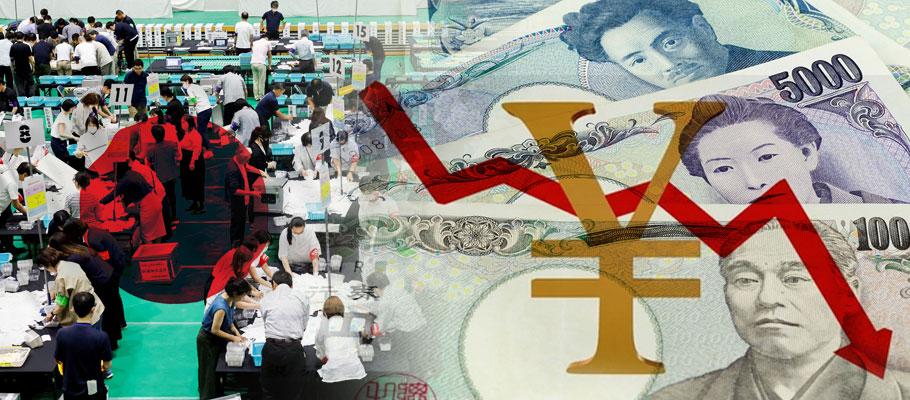
Published: October 8th, 2025
The yen stumbled badly this week after Japan's ruling Liberal Democratic Party (LDP) elected Sanae Takaichi as their new leader, a hard-line conservative known for championing higher government spending and cheap borrowing. Markets interpreted her victory as a shift to looser fiscal policy, and promptly took Yen to the woodshed.
On Tuesday 7th October the USD/JPY vaulted past 150, its highest in months. The GBR/JPY blew through 200 to reach 202, and EUR/JPY climbed to 175 from Friday's 173.19.
Analysts at MUFG Bank said the result “triggered outsized moves” across Japan's markets. Equities soared, with the Nikkei 225 up nearly 5%. Long-term Japanese government bond yields also jumped, the 30-year JGB rising 13 basis points to a year-to-date high.
The simultaneous fall in the Yen and rise in yields suggest that fiscal stimulus, not restraint, is back in fashion. Traders who had previously expected further Bank of Japan (BoJ) tightening began to rethink. “The Japanese rate market has responded accordingly to pare back expectations for further BoJ rate hikes,” MUFG noted.
Takaichi has long styled herself the guardian of “Abenomics”, the economic programme pioneered by the late Shinzo Abe, a mix of monetary largesse, fiscal pump-priming and structural reform designed to end deflation and revive growth.
Investors are focusing on the first two arrows of that policy quiver: more money and cheaper credit. Takaichi has advocated what she calls “responsible aggressive fiscal policies,” code for more public works and possibly more borrowing. She was the only leadership contender who openly described extra deficit financing as “unavoidable.”
That stance suggests Japan's already swollen public debt, well over twice GDP, could grow yet further. MUFG warns that the “combination of heightened fiscal risks and delayed or derailed BoJ rate-hike plans” may keep the yen under pressure unless markets see evidence to the contrary.
Whether Ms Takaichi can revive the Abe-era stimulus with impunity is another question. Japan's trading partners are unlikely to applaud. The U.S. Treasury Department, in its June 2025 exchange-rate report, urged the BoJ to continue tightening policy to “normalise the yen's weakness.” In August, Treasury Secretary Scott Bessent accused Tokyo of being “behind the curve” on inflation and signalled that Washington wanted higher Japanese rates.
A Takaichi-led retreat from tightening could thus invite renewed American criticism. As MUFG analysts put it, “The weaker yen may start to attract more attention from the Trump administration, keeping pressure on Japan to continue normalising monetary policy.” For now, though, traders see little imminent risk of intervention. Most expect the BoJ to tread carefully and delay any rate moves until coordination with the new government becomes clearer.
Japan's central bankers face an awkward balancing act. Inflation has ticked above the BoJ's 2% target but remains fragile. Wage growth is tepid, and consumers, squeezed by higher import prices, are cautious spenders. Against that backdrop, an overtly expansionary fiscal stance could complicate efforts to guide inflation gently higher without undermining the yen.
Even tentative rate-rise discussions could be deferred. “Initial talks between the BoJ and government may delay plans for a hike as early as this month,” MUFG suggests. The October 30 policy meeting is now seen as the earliest realistic window for action, giving time for officials to assess the political and fiscal mood.
The Yen's slide has been accentuated by developments abroad. The dollar index has been treading water around 98 for months. Though US yields have fallen sharply since August, the currency has found support from global risk aversion and lingering doubts about other economies' prospects.
Markets still expect the Federal Reserve to cut rates by 25 basis points at its next meeting and to ease by roughly 67 bps by year-end. But softening inflation may constrain further cuts. Upcoming U.S. producer- and consumer-price data will show whether recent tariff increases are filtering into higher prices, potentially complicating the Fed's calculus.
Meanwhile, the American labour market looks less sturdy. Employment growth has slowed to 27,000 a month on a four-month average, and official revisions have wiped out 911,000 jobs from earlier tallies.
If domestic politics are undermining Japan's currency, American politics may yet come to its rescue. Analysts at ING Bank argue that the Yen could outperform as a hedge against turmoil in Washington, where a government shutdown has begun.
Congress failed to pass a spending bill by September 30th, forcing departments to halt “non-essential” operations from October 1st. The impasse has spooked investors, raising doubts about near-term U.S. growth. “The dollar has suffered from rising risk from the U.S. government shutdown and falling oil prices over the weekend, with the yen emerging as the top performer,” ING observes.
Currency traders often buy the yen during bouts of global stress, trusting its liquidity and Japan's creditor-nation status. A prolonged American shutdown could therefore lift the yen temporarily, even if domestic fundamentals point the other way.
The tug-of-war between political stimulus and monetary caution leaves Japan's financial markets perched on an uneasy equilibrium. The surge in equities may please the new prime minister, but a weaker Yen risks rekindling import-price pressures and aggravating households already facing higher living costs. For the BoJ, the task of maintaining credibility while cooperating with an expansion-minded government will be delicate.
If Takaichi's policies do resemble a reheated Abenomics, the irony will not be lost on investors. After a decade of experiments in easy money, Japan's problem is no longer deflation but direction; that is, how to grow without debasing its currency or alarming its allies.
For now, the Yen's fate hinges less on charts than on politics. A revival of fiscal fireworks at home and fiscal paralysis abroad make for an unpredictable mix. Japan's currency has long been called a safe haven. These days, it looks more like a political barometer, rising and falling with the fortunes of its leaders, and the tempers of its friends.